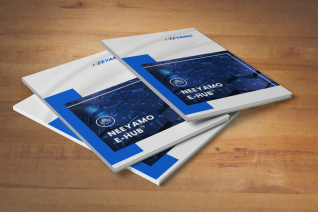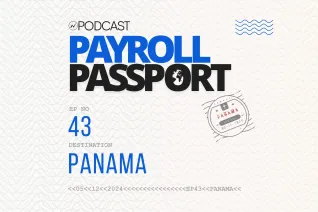Establish your presence globally with Neeyamo as we help you go beyond borders to manage your international payroll and hire new talent in Panama.
Overview
Panama holds a unique geographic distinction as the only country in the world where you can witness both the mesmerizing sunrise over the Caribbean Sea and the breathtaking sunset over the Pacific Ocean. Other than its stunning views, the country is also known for its unique and dedicated workforce.
Do your organization's expansion plans require hiring employees in Panama? Do you lack a physical entity in the country – a key requisite to hire local talent? Neeyamo – one of the top Global payroll providers, assists organizations worldwide with onboarding and managing employees in Panama- processing payroll and tax services, providing business payroll software, managing local compliance requirements, benefits, and more.
Tools And Instances
Facts And Stats
Capital
Panama City
Currency
Panamanian Balboa (PAB), United States Dollar (USD)
Official Language
Spanish
Fiscal Year
1 January - 31 December
Date Format
MM/DD/YYYY
Country Calling Code
507
Time Zone
UTC -05:00
Global Payroll
Overview
What is payroll?
Payroll is the list of compensation to be paid to employees of a company or organization for a set period or date. Global payroll provider companies allow organizations to outsource their payroll, allowing employers to focus on other aspects of their business.
What is Global Payroll?
Handling payroll for a widespread workforce can pose a significant challenge for any organization, and the added complication of compliance can make things worse. If companies spend more time processing payroll, it directly impacts day-to-day operations and their overall productivity. The solution to this is global payroll outsourcing.
What is a global payroll system?
Over the years, Neeyamo – Global Payroll Services has observed these complexities and strived to provide global payroll solutions through a single technology platform – Neeyamo Payroll. Neeyamos global payroll systems ease the process for companies looking to outsource their global payroll requirements and aid them in maneuvering the tricky payroll system in Panama. Neeyamos payroll software provides the perfect solution for all your global payroll needs – for employees working in primary geographies, the long-tail region, remote or internationally located.
How is payroll calculated?
Neeyamo acts as your personalized Payroll Calculator. Ensuring adherence to local regulatory requirements using multi-level controls. Providing timely and accurate payroll, courtesy of our experts worldwide and using a tech-based integrated smart helpdesk solution with seamless support experience manned by payroll experts - Neeyamo has all your payroll needs covered.
Payroll Taxes
What is Payroll Tax?
Payroll tax is the percentage amount retained from an employee's salary and paid to the government to invest in the general population's welfare. These are statutory in nature and are levied from both the employer and employee. Additional statutory contributions are made by employers towards aiding both short-term and long-term benefits for their employees.
Employee Taxes
Employee Payroll Contributions
- 9.75% - Social security
- 1.25% - Education contribution
- 11.00% - Total Employee Cost
The employee income tax bracket is as follows;
| Upto 11,000 USD | 0% |
| 11,000 USD to 50,000 USD | 15% |
| Above 50,000 USD | 25% |
Employer Taxes
Employer Payroll Contributions
- 12.25% - Social security
- 1.92 - Unemployment
- 1.50% - Education Tax
- 0.98-5.67% - Accident
- up to 21.34% - Total Employment Cost
Payroll Cycle
Overview
Undoubtedly, payroll is a critical process for any organization. The pay cycle in Panama refers to the period an organization pays its employees, which can vary depending on the pay frequency the organization chooses to adopt.
Frequency
In Panama, the payroll frequency is stipulated in the employment contract, paid monthly or weekly.
13th Month Cycle
In Panama, 13th-month payments are mandatory, and the amount of an additional month’s salary is paid in three equal installments on the 15th of April, August, and December.
Global Work
Overview
EOR: Meaning
An Employer of Record services (EOR) provider helps you eliminate the hassle of handling complexities while onboarding a new employee in an international location. They help bridge the gap that otherwise mandates organizations to have a local registered entity and a local bank account, prior to making a job offer to an international hire.
An EOR service provider acts as a legal employer, facilitates salary payments, and manages other statutory requirements such as health insurance, payroll taxes, and employee benefits, ensuring compliance with local tax laws and regulations.
This allows organizations to focus on collaborating with the employees in Panama for operational tasks, with the knowledge that they have a cost-effective solution to support their global payroll & HR requirements, as they continue their global expansion.
HR Mandates and Practices
Minimum Wage
In Panama, minimum wages depend on the establishment's economic activity, specific occupation, and size. Minimum wages typically range from 326.56 USD to 971.35 USD per month.
Overtime
All work over standard working hours is to be paid as overtime and is regulated by employment contracts/collective agreements etc. When an employee is requested to work overtime or on holidays, there are maximums concerning the number of hours allowed. These maximums are three additional hours per day, 9 hours per week, and if the work is deemed hazardous to one’s health, an employee should not perform overtime.
All overtime hours over 48 hours a week are to be paid at an overtime compensation rate; this rate is dependent on the hours in which the overtime is carried out.
- Hours performed between 6.00 am and 6.00 pm are paid at 125.00% of the employee's regular wage.
- Hours performed between 6.00 pm and 6.00 am or on a rest day or holiday are paid 150.00% of the employee’s regular income.
- Hours carried over from working during the night increased to 175.00% of the employee’s standard rate pay.
Data Retention Policy
Employers must save all records of payments, amounts withheld, and remitted for at least seven years. The statute of limitations on tax liabilities is seven years, but the statute of limitations on tax remittances is 15 years. The National Financial Authority may conduct financial audits for taxes owed up to three years before the audit date. Employers must maintain a record of all employees' work schedules and hours worked.
Hiring and Onboarding Requirements
Hiring
Nowadays, no preference in hiring has been established by law. The employment contract shall be in writing and signed upon commencement of an employment relationship.
The employment contract shall contain:
- Personal data: Name, nationality, age, sex, civil status, address, and the number of parties. If the employer is a juridical person, its name or trade name, address, name of its legal representative, and the data recorded in the Public Registry shall be provided.
- Dependents of the employee.
- Workplace: The place or place the work or services are required to be performed.
- Term: If it is for a fixed period or an appropriate clause for an indefinite period or a specific piece of work.
- The duration and regular division of the workday.
- The wage, the form thereof, and the day and place of their payment.
- The place and date of the employment contract signing.
- The signature of the parties.
Onboarding
The following documents and details are required for foreign employees.
- A passport that is valid for at least six months beyond the intended duration of stay in Panama
- A copy of the information page of the passport
- A completed visa application form with Four passport photos
- An employment contract with a company based in Panama
- Proof of accommodations in Panama
- A medical certificate stating that the applicant is in good health
- Police background check certificate from the applicant’s country of residence
Probation
In Panama, probation periods are outlined in the employees’ employment contract/collective agreement. The probation period is typically around three months.
Leave
Public Holidays
Panama's national public holidays are:
- January 01 - New Year's Day
- January 09 - Martyr's Day
- February 18 and February 22 - Carnival
- March 20 - March Equinox
- April 06 - Maundy Thursday
- April 07: Good Friday
- April 08 - Holy Saturday
- April 09 - Easter Sunday
- May 02 - Labor Day
- June 21 - June Solstice
- August 15 - Foundation of Old Panama City
- September 23 - September Equinox
- November 03 - Independence Day
- November 04 - National Symbols Day
- November 05 - Colon Day
- November 10 - Los Santos Uprising Day
- November 28 - Independence Day
- December 08 - Panama Mother's Day
- December 21 - December Solstice
- December 24 - Christmas Eve
- December 26 - Christmas Day
- December 31 - New Year Eve
Annual Leave
An employee in Panama is entitled to 30 days of paid annual leave following the commencement of 12 months of employment. Employers must provide annual leave payment three days before the vacation and cannot be compensated in lieu of payment.
Sick Leave
Employees are entitled to 18 days of paid sick leave.
Maternity Leave
Maternity leave starts six weeks before the expected delivery date and ends eight weeks after delivery, for a total of 14 weeks.
Maternity pay is paid by the Social Security system (provided that the employee has accrued a total of nine monthly Social Security quotas before the seventh month of pregnancy). If the employee has not accrued the minimum, the employer will make the payment (calculated as the greater of the last salary or average of the last 180 workdays).
In the case of multiple, difficult birth or pregnancy-related illnesses, the leave can be extended upon presenting a medical certificate.
Female employees are protected during maternity leave and cannot work rest days or overtime hours.
Adoptive mothers are entitled to 28 days of paid leave.
Paternity Leave
Employees are entitled to three days of fully compensated paternity leave following the birth of their child; the employer compensates this leave.
Parental Leave
There are no provisions in the law regarding parental leave.
Paternity Privilege Leave
Panama's Law 238 of 2021 extended maternity leave benefits to fathers under specific circumstances. This law, initially delayed due to the COVID-19 pandemic, now takes effect from January 1, 2024.
Fathers can avail paternity leave if the mother dies during or after childbirth, or if the mother is unemployed during pregnancy and the first year post-birth. Eligible fathers receive 15 days of paid leave and job protection.
To claim paternity leave, fathers must provide necessary documentation such as death certificates, pregnancy certificates, and proof of the mother's unemployment.
Termination
Overview
The termination process varies according to the employment agreement and collective agreement in place and is based on the type of contract and reason for termination. All termination must be provided in writing and follow the laws outlined in the Panama Labor Law; unjustified dismissals may be trialed in labor court. The employer may dismiss the employee if the court cannot resolve the claim within 60 days.
Employees cannot be dismissed when pregnant or for their involvement in trade union activities, strikes, or complaints against their employer.
However, there are certain classifications of employees that may be dismissed without just cause (domestic workers, fishing or agricultural workers, and retail workers)
Notice Period
Employers may terminate an employee during their probation period without notice. In general, notice periods cannot exceed three months and are commonly 30 days.
Severance Pay
Severance pay is not required unless in the case of dismissal due to redundancy; the severance payment for redundancy is dependent on the employee’s length of service as follows:
- Up to 6 months of employment– .5 months of pay
- Up to 9 months of employment- .75 months of pay
- Up to 1 year of employment- 1 month of pay
- Up to 2 years of employment- 3 months of pay
- Up to 4 years of employment- 4.5 months of pay
- Up to 5 years of employment- 5.2 months of pay
- Up to 10 years of employment- 9.75 months of pay
- Up to 20 years of employment- 14.8 months of pay
Visa
Overview
As a general rule, employers/companies must make up 90% of their workforce via Panamanian citizens or foreigners who are either married to a Panamanian citizen or who have resided in the country for at least ten years. They can engage an expert or foreign technical personnel, but this must not exceed 15% of the total number of workers.
Employers who need to contract foreign personnel must obtain authorization issued by the Ministry of Labour.
This authorization, or work permit, is valid for renewable one-year periods, except for citizens of certain specific countries who may obtain a permanent work permit. Employees under the Marrakech Treaty may renew their resident and work permits, but only for a maximum of six years.
The most popular Visa is the Pensionado Visa (for retirees). The requirements for getting a Pensionado Visa are proof of a lifetime income of at least 1,000 USD per month for one person plus an additional 250 USD for each dependent.
Employee Background Checks
Legal and Background Checks
In recent years, Panama has taken significant legislative steps to regulate electronic data protection and internet commerce. However, this regime remains a work in progress.
The primary laws and regulations thus far enacted are Law 51 of 22 July 2008, as amended by Law 82 of 9 November 2012 (‘Law 51’), and Executive Decree No. 40 of 19 May 2009 (‘Decree 40’). The central purpose of both Law 51 and Decree 40 is to regulate the creation, utilization, and storage of electronic documents and signatures in Panama through a registration process and the supervision of providers of data storage services. Law 51 and Decree 40 provide for enforcement through the General Directorate of Electronic Commerce (Dirección General de Comercio Electrónico) ('DGCE').
In Panama, personal information is protected at the constitutional level. The Constitution provides that any person or entity that obtains personal information and/or personal documents, either from a person or a company who provides such information willingly or through any other means, may not disclose such information without the consent of its lawful owner (there is no specific definition or explanation of who is considered the ‘lawful owner’ of personal information). An exception to the consent rule is disclosing such information pursuant to a valid judicial or governmental request.
The disclosure of personal information without consent is also prohibited by the Panamanian Criminal Code. Criminal penalties apply to the disclosure of personal information when the disclosure causes harm to the information’s lawful owner. Law 51 specifically establishes that this criminal law prohibition applies to electronically stored information.
Last updated on August 05, 2024
If you have any queries or suggestions, reach out to us at irene.jones@neeyamo.com
Have Queries? Get In Touch With Us
Get in touch with one of our experts and take a quick demo of our services










